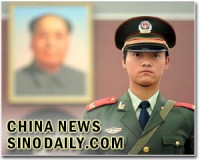 |
Beijing (AFP) May 26, 2011 The international community's mixed response to China's crackdown on dissent -- ranging from public criticism to total silence -- has handed Beijing leeway to maintain its hard line, experts say. Since Chinese authorities, apparently spooked by the pro-democracy uprisings sweeping the Middle East, began detaining lawyers, artists and other activists in February, a parade of Western leaders have met with Beijing's top brass. Some have slammed China over the clampdown -- US Secretary of State Hillary Clinton this month called it a "fool's errand". Others such as Brazilian President Dilma Rousseff, who visited Beijing last month, have avoided making criticism in public. Jean-Philippe Beja, a China expert based in France, said Beijing has appeared inflexible "because Western countries have not really exerted any significant pressure". "Among the few dissidents who have been freed, their releases have only been secured after public pressure," Beja told AFP. Human Rights Watch Asia researcher Nicholas Bequelin agreed, suggesting that the West was in part compromised by its commercial relations with the world's second-largest economy. "Many Western countries scuppered international principles by treating China differently" from other hardline governments due to their "economic interests", but also to a "lack of realism" about China's political system, Bequelin said. The veteran Hong Kong-based HRW researcher said the detention last month of avant-garde artist Ai Weiwei -- a government critic well known in the West who could face tax evasion charges -- symbolised the failure of foreign governments to exert pressure on Beijing. Bequelin said Ai's detention was made possible because there were "very few international reactions" calling Beijing to account from the start of the crackdown, the worst seen in China since the post-Tiananmen era. The United States has been the most strident in its condemnation. President Barack Obama pressed Beijing on rights issues during high-level talks in Washington this month, while Clinton called China's record "deplorable". In late April, US Assistant Secretary of State Michael Posner accused China of "serious backsliding" on human rights following talks in Beijing and indicated that Chinese leaders had rebuffed appeals to soften the crackdown. Also last month, Australian Prime Minister Julia Gillard said she had raised a range of human rights "concerns" in talks in Beijing with Chinese Premier Wen Jiabao, who told her China had not taken a "backward step". But others have been more muted in their criticism. Just last week, European Union President Herman van Rompuy said the "underlying fundamentals of rule of law, social justice, and human rights" are key to sustainable economic and social development. Spanish Prime Minister Jose Luis Zapatero Rodriguez took an even less robust stance, voicing support for "freedom and fundamental rights"... across Asia. The public silence of Brazil's Rousseff was apparently matched by that of French parliamentary leader Bernard Accoyer, who met Chinese President Hu Jintao in late April. One Western diplomat based in Beijing admitted EU foreign policy chief Catherine Ashton had "not exactly been reactive on these issues", adding: "One gets the impression that she's dragging her feet." And former French prime minister Jean-Pierre Raffarin, who travels several times a year to China, told AFP "the rules of diplomacy generally rule out public challenges." Raffarin said that each time he comes to China, he "directly" raises human rights issues, and added that French President Nicolas Sarkozy had debated the topic with Hu in late March. In the face of public and private official pressure, China -- concerned above all with maintaining social stability -- has remained firm. State Councilor Dai Bingguo, one of the two officials who led the Sino-US talks in Washington, spoke of the "enormous progress" China has made on several fronts including human rights. Vice Foreign Minister Fu Ying meanwhile accused Europe of a "condescending" attitude towards Beijing at talks in Hungary this month, and a foreign ministry spokeswoman said other countries should stop commenting on Ai's case. Talks with China are "a dialogue of the deaf", said the Western diplomat. "They don't understand why we are interested in these cases, in these 'anti-Chinese' people." Beja said the rights approach taken by Beijing may not enjoy universal approval within the ruling Communist party, noting that pushing on the issue could "reinforce those who are convinced the party line must be softened". A concerted collective effort by the West on specific cases like that of Ai or jailed Nobel peace laureate Liu Xiaobo "could make the cost of their continued detention too high", he added.
Share This Article With Planet Earth
Related Links China News from SinoDaily.com
 Unrest in China after Mongol herder's death: group
Unrest in China after Mongol herder's death: groupBeijing (AFP) May 25, 2011 Hundreds of ethnic Mongols have protested in China this week over the killing of a shepherd that has sparked online calls for even bigger future demonstrations, human rights organisations have said. The unrest in China's Inner Mongolia region was sparked by the May 10 death of a herder named Mergen, who was run over by a truck driven by an ethnic Han Chinese, the US-based Southern Mongolian ... read more |
|
| The content herein, unless otherwise known to be public domain, are Copyright 1995-2010 - SpaceDaily. AFP and UPI Wire Stories are copyright Agence France-Presse and United Press International. ESA Portal Reports are copyright European Space Agency. All NASA sourced material is public domain. Additional copyrights may apply in whole or part to other bona fide parties. Advertising does not imply endorsement,agreement or approval of any opinions, statements or information provided by SpaceDaily on any Web page published or hosted by SpaceDaily. Privacy Statement |